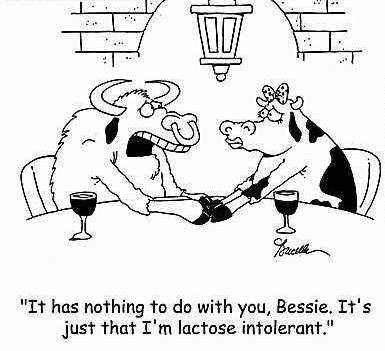-
May10
10 Telltale Signs of Food Intolerances
Filed under: Symptoms;7 Comments




 by
by 
 Food Intolerances are a fast growing problem in today’s society, especially with Leaky Gut Syndrome. This is in large part because few people ever correlate their symptoms with their diet or the foods they eat. And in many cases, this is because it can take up to 48 to even 36 hours after ingestion before you develop any symptoms at all.
Food Intolerances are a fast growing problem in today’s society, especially with Leaky Gut Syndrome. This is in large part because few people ever correlate their symptoms with their diet or the foods they eat. And in many cases, this is because it can take up to 48 to even 36 hours after ingestion before you develop any symptoms at all.And just for clarification purposes, it should be noted that food intolerances differs from true food allergies by medical definition. The medical community only considers a true food allergy as an IgE mediated immune response which is best known for its immediate and severe reactions such as anaphylaxis, acute swelling, hives, etc.
Food intolerances on the other hand are oftentimes delayed and the symptomatic response is far less severe and oftentimes unrightfully ignored. However, as you continue to eat the foods that you are intolerant to then the continuous inflammation that is generated is enough to cause some significant damage within your body.
Food intolerances can occur due to…
- Inability to produce the necessary chemical or enzyme required to digest the food
- A reaction to naturally occurring chemicals in the food
- A non-IgE mediated immune response
Below I’ve listed 10 signs or symptoms of food intolerances that you need to be aware of.
 1. Gas and Bloating
1. Gas and BloatingThere are a lot of causes of gas and bloating but this is too often overlooked. More often than not, it stems from the inability to properly digest the intolerant food. Then this undigested food can become food for unfriendly bacteria in your gut.
2. Nasal Congestion
This is one of the most overlooked reactions when it comes to food intolerances, largely because few people understand the link between the mucus production and your immune system.
3. Constipation or Diarrhea
This is another sign that can have many causes and in most cases, this can be tied directly to the dysbiosis that is created due to food intolerances.
4. Chronic Fatigue
Anytime you get sick and your immune system must work overtime, you experience fatigue. This is because your body is using your energy to support your immune system instead of your muscles.
To your body, food intolerances are no different than you getting sick.
5. Eczema, Skin Rashes, and Hives
Skin conditions are another very common sign that is most often related to histamine reactions from immune antibodies.
 6. Mood Swings, Depression, Irritability
6. Mood Swings, Depression, IrritabilityHave you ever eaten a meal only to find yourself in a foul mood not too long after for no reason whatsoever? It could be related to blood sugar instability but oftentimes it’s from eating foods that you are intolerant to.
7. Acid Reflux and Heartburn
Food intolerances such as gluten and dairy have also been shown to be common sources of acid reflux, heartburn, and GERD.
8. Headaches and Migraines
Research is showing more and more cases of migraines being triggered by certain foods and food chemicals that are present is the vast majority of our food supply.
9. Joint and Muscle Pain
Joint and muscle pain is another common cause of histamine reactions within the body that drive inflammation to joints and muscle tissue.
10. Weight Gain
Food intolerances oftentimes lead to weight gain due to the chronic stress involved along with the damage and dysfunction caused to the digestive system.
If you're new here, you may want to subscribe to my RSS feed and get notified of new posts. Thanks for visiting!





 by
by 
7 responses to “10 Telltale Signs of Food Intolerances” 
-
Are there any treatment centers in the US that deal with gluten intolerance and leaky gut in the same manner as alcohol abuse ?
-
Crystal Yeates April 12th, 2013 at 08:16
Well, how are we supposed to narrow this down. It could be a food intolerance, or something else honestly. This is so ambiguous unless the reaction hasn’t happened before or is rather immediate. There should be an accurate test to check for food intolerances that is covered by insurance cause this is all too frustrating.
-
There are a number of things you CAN do on your own…
*Listen to your body carefully and track when you are feeling low. Keeping a food journal
Can certainly help.
*Go on an elimination diet. You can google this, but for me that meant going on a 3-day
Water-only fast then adding in fruits/vegetables. After a week on fruits/vegetables then
try only 1-2 “new” foods every 3-4 days. Keep a close eye out for any reactions and record
That. Try that food again a few weeks later to verify that it was the cause.Remember, you know your body best and you are the only one who cares about it deeply. Drs
Only do what gets them a paycheck and often assume patients are not willing to do “whatever
It takes”. You are your best advocate and you CAN do this!Through my elimination diet/fasting I discovered I didn’t just have a gluten problem, but also
Severe reactions to dairy, peanuts & beans. All the “gluten-free” flour mixes (containing bean flours) were causing me Ongoing issues after going gluten-free! Very eye-opening!Good luck!
-
Kevin Georgison June 15th, 2015 at 20:53
For those that have many medical issues that confuse our ability to identify food intollerances with other non-ingestion issues would the Mediated Release Test be the most reliable route?
-
Sarah July 13th, 2015 at 19:43
I get bloated and gassy a lot of times if I haven’t eaten for like 4 or 5 hours. Sometimes it does it some times it doesn’t. Why? I’m doing a whole 30 diet and have been doing it for a while now. But the bloating didn’t start when I did whole 30. I’ve had this problem for a while. I am also 4 months post op weight loss surgery because I gained so much weight from all my stomach issues over the years plus my pcos.







Terry E. Whaley Sr. December 4th, 2012 at 07:25